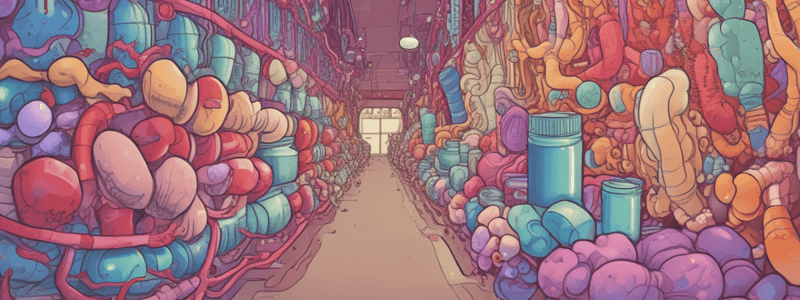Podcast
Questions and Answers
To identify and eradicate the causative ______
To identify and eradicate the causative ______
organism
To prevent ______
To prevent ______
complications
To prevent spread to ______
To prevent spread to ______
contacts
Treatment ______ include identifying the causative organism.
Treatment ______ include identifying the causative organism.
One objective is to ______ the spread to contacts.
One objective is to ______ the spread to contacts.
Which antibiotic must be administered intravenously or deeply intramuscularly for seven to ten days?
Which antibiotic must be administered intravenously or deeply intramuscularly for seven to ten days?
What is the alternative treatment regimen that combines Benzyl Penicillin and another drug, and how long should it be administered?
What is the alternative treatment regimen that combines Benzyl Penicillin and another drug, and how long should it be administered?
How should the initial treatment for the recommended antibiotics be administered?
How should the initial treatment for the recommended antibiotics be administered?
For what duration is the combination of Ceftriaxone and Vancomycin administered?
For what duration is the combination of Ceftriaxone and Vancomycin administered?
Which of the following medications is part of an alternative treatment regimen with Benzyl Penicillin?
Which of the following medications is part of an alternative treatment regimen with Benzyl Penicillin?
The combination of Clindamycin plus ______ is an alternative treatment for penicillin allergy.
The combination of Clindamycin plus ______ is an alternative treatment for penicillin allergy.
An alternative treatment regimen includes Cefotaxime and ______.
An alternative treatment regimen includes Cefotaxime and ______.
[Blank] combined with Chloramphenicol is used as an alternative for those with penicillin allergies.
[Blank] combined with Chloramphenicol is used as an alternative for those with penicillin allergies.
Patients allergic to penicillin can be treated with Clindamycin plus Chloramphenicol or ______ and Vancomycin.
Patients allergic to penicillin can be treated with Clindamycin plus Chloramphenicol or ______ and Vancomycin.
For penicillin allergy, a treatment option is Cefotaxime and ______.
For penicillin allergy, a treatment option is Cefotaxime and ______.
For bacterial meningitis in adults under 50 years, the empirical treatment includes Ceftriaxone and ______.
For bacterial meningitis in adults under 50 years, the empirical treatment includes Ceftriaxone and ______.
For adults over 50 years, Listeria is a suspected pathogen and the empirical treatment includes Ceftriaxone or Ampicillin and ______.
For adults over 50 years, Listeria is a suspected pathogen and the empirical treatment includes Ceftriaxone or Ampicillin and ______.
For hospital-acquired bacterial meningitis, the empirical treatment includes Ceftazidime plus or minus ______.
For hospital-acquired bacterial meningitis, the empirical treatment includes Ceftazidime plus or minus ______.
An alternative treatment for meningitis in adults under 50 years includes Meropenem or ______.
An alternative treatment for meningitis in adults under 50 years includes Meropenem or ______.
Fluoroquinolone is an alternative treatment for bacterial meningitis in adults older than ______ years.
Fluoroquinolone is an alternative treatment for bacterial meningitis in adults older than ______ years.
Flashcards are hidden until you start studying
Study Notes
Antibiotic Penetration
- Chloramphenicol, metronidazole, isoniazid, and pyrazinamide can penetrate the CSF even when the meninges are not inflamed
- β-lactam antibiotics, quinolones, and rifampicin can only penetrate the CSF when the meninges are inflamed
- Aminoglycosides, vancomycin, and erythromycin poorly penetrate the CSF under all circumstances
Goals of Management
- Rapid administration of a bactericidal antibiotic with good CNS penetration is necessary to treat neurologic infections
- Good tissue penetration is required to treat possible extra-CNS sources
- Anti-inflammatory agents should be used to suppress complications of bacterial lysis
Treatment Objectives
- Identify and eradicate the causative organism
- Prevent complications
- Prevent spread to contacts
Antibiotic Penetration in the CSF
- Chloramphenicol, metronidazole, isoniazid, and pyrazinamide can penetrate the CSF even when the meninges are not inflamed.
- β-lactam antibiotics, quinolones, and rifampicin can only penetrate the CSF when the meninges are inflamed.
- Aminoglycosides, vancomycin, and erythromycin have poor penetration into the CSF under all circumstances.
Goals of Management for Neurological Infections
- Rapid administration of a bactericidal antibiotic with good CNS penetration is essential to treat neurological infections.
- Antibiotics with good tissue penetration are necessary to treat possible extra-CNS sources of infection.
- Anti-inflammatory agents can help suppress complications resulting from bacterial lysis.
Treatment Objectives
- Identify and eradicate the causative organism.
- Prevent complications.
- Prevent the spread of infection to contacts.
Treatment Options
- Cetriaxone IV/deep IM for 7-10 days, or Vancomycin IV (Evidence Rating A).
- Alternative treatment: Benzyl Penicillin IV plus Chloramphenicol for 14 days (Evidence Rating A).
- All treatment should be administered intravenously initially.
Antibiotic Penetration in CSF
- Chloramphenicol, metronidazole, isoniazid, and pyrazinamide penetrate the CSF when the meninges are not inflamed
- β-lactam antibiotics, quinolones, and rifampicin penetrate the CSF only when the meninges are inflamed
- Aminoglycosides, vancomycin, and erythromycin poorly penetrate the CSF under all circumstances
Goals of Management for Neurological Infections
- Rapid administration of bactericidal antibiotics with good CNS penetration to treat neurologic infections and good tissue penetration to treat extra-CNS sources
- Use of anti-inflammatory agents to suppress complications of bacterial lysis
Treatment Objectives
- Identify and eradicate the causative organism
- Prevent complications
- Prevent spread to contacts
Treatment Options
- Cetriaxone IV/deep IM (7-10 days) and Vancomycin IV
- Alternative: Benzyl Penicillin IV plus Chloramphenicol (14 days)
- All treatment should be intravenous initially
Penicillin Allergy Management
- Clindamycin plus Chloramphenicol
- Or Cefotaxime and Vancomycin
Empirical Antibiotic Therapy for Suspected Bacterial Meningitis in Adults
Age-Related Empirical Treatment
-
For adults < 50 years old:
-
Most common pathogens are Meningococcus, Pneumococcus, Haemophilus Influenza
-
Empirical treatment is Ceftriaxone and Vancomycin
-
Alternative options for specialist care include Meropenem, Chloramphenicol, and Fluoroquinolones
-
For adults > 50 years old:
-
Most common pathogens are Pneumococcus, Listeria, and Gram-Negative Bacilli
-
Empirical treatment is Ceftriaxone or Ampicillin and Vancomycin
-
Alternative option for specialist care is Fluoroquinolone
Hospital-Acquired Meningitis
- Most common pathogens are Staphylococci, Gram-Negative Bacilli, and Pneumococcus
- Empirical treatment is Ceftazidime with or without Gentamycin
- Alternative option for specialist care is Meropenem
Studying That Suits You
Use AI to generate personalized quizzes and flashcards to suit your learning preferences.





